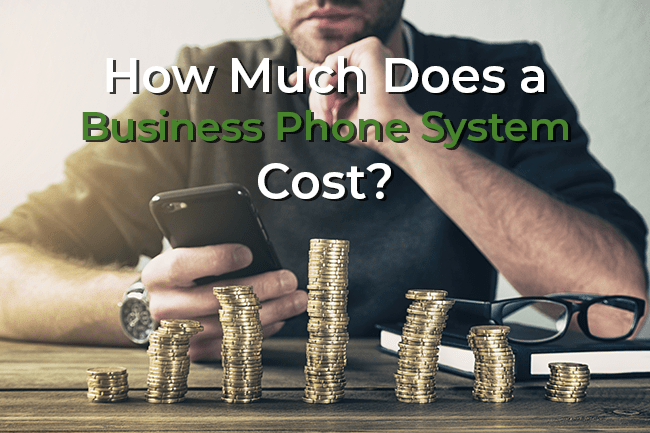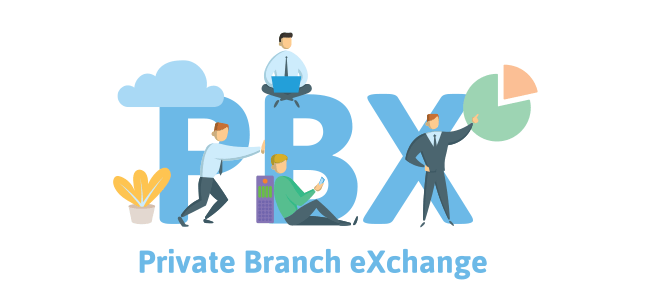
8 MIN READ | BUSINESS PHONE SYSTEMS
If you're searching to learn more about the cost of a business phone system, chances are you're looking for more than what you’ll find at a retail store. You may have also tried options through a communications carrier like Verizon or AT&T only to discover they don't fit your needs.
Here, we’re going to break down the cost of business phone systems provided by an office technology company based on our industry research. The systems we’ll discuss are for growing and/or established businesses needing 21st century phone options.
Not a lot of time? Skip to what you need:
Not a lot of time? Skip to what you need:
What is a PBX Phone System?
Business Phone System Features
On-Premise Phone System Costs
What About Phone System Service?
Hosted Phone System Costs
Important Considerations for Host Phone System
Other Considerations
Business phone systems have evolved over the decades but technically, we’re still talking about switches and lines. That said, today’s systems can be fully integrated into your network without you needing to go to that drawer full of wires and adapters to rig something up. Instead, your business can benefit from a seamless system to provide the most efficiency.
You’re likely thinking “a system that advanced must be more expensive, right?” The answers below may surprise you.
There are two main options you can choose from when purchasing a business phone system through a service provider:
- On-Premise Phone Systems
- Hosted Phone Systems
We’ll break each one down by benefits and costs. But first...
What is a PBX Phone System?

Private Branch Exchanges (PBX) serve as a private phone network within a company. They allow businesses to make internal calls to other phones on its network through an extension, as well as outbound calls to outside locations.
PBX phone systems include an on-premise server or virtual server for handling calls (like an operator at a switchboard), and multiple phone lines that terminate and are within the PBX.
Regardless of whether you choose on-premise or hosted, you will need a PBX.
Business Phone System Features

There are advantages to having a business phone system over simply relying on personal cell phones or having to make use of other retail options. Some of the features that you may find useful for your business include:
Mobility: The ability to forward calls directly to an employee's cell phone if they are away from their desk. Gone are the “I’m away from my desk” frustrations your customers would experience.
Conferencing: The ability to have numbers greater than three on a single call (most retail options only allow up to three on a single call).
Instant Messaging: This allows you to text a caller back from your computer when you aren't able to speak with them at the time of their call.
Call Center: Advanced features include the ability to record calls for training purposes, track metrics, and leverage "call whisper" (allowing a team member to speak into the earpiece of another while on the phone with a customer - without the customer being able to hear).
Call Flip: Allows a user to continue a call on their mobile device that originated from their desktop phone.
On-Premise Phone System Costs
$800-$1,000 per user (paid at one time)
The price given includes the phone, PBX, license, and first year of maintenance/support from the manufacturer (which in most cases is optional). Let's breakdown each so you have a better understanding of what goes into these numbers.
Phone
There are generally three phone options when you purchase a business phone system: basic, black and white or color, and executive/conference
Basic: a standard phone that has simple call features and is typically only found in a break room or front lobby as a courtesy phone.
B&W or Color: a step up from the Basic model, this phone includes a black and white or color LCD display that will project certain features on its screen - like caller-ID. This is the most common model purchased for the majority of offices.
Executive/Conference: the highest end of phone models which may include a touchscreen display and allows for conferencing external microphones to be connected to the phone for more effective conferencing. Typically, only used in a conference room or by senior management at most companies.
PBX (Private Branch Exchange)
This must include an on-premise server in order to operate, however, companies that don't have this capability may find some cost savings in utilizing a virtual server through a service provider.
If you choose to go with an on-premise server, keep in mind there are additional costs associated with that purchase. Examples would include the air conditioned room and the power required to keep a server at optimal temperatures to avoid overheating.
The requirements of the technology chosen (phones) will change the total cost of the PBX system. The range above is typically included in the total cost of the phone system.
Licensing
Licensing can be broken down into four categories:
- Telephony/Basic
- Extensions and mailboxes
- Ad hoc 3-party audio conferencing
- Essentials
- Everything above
- Desktop client - allows for computer integrated phone
- Web and App Dialer
- Professional Call Manager
- Instant Messaging and Collaboration (server required)
- Instant Messaging
- Collaboration (requires audio & web licenses)
- Mobility Basic (call forwarding to person/company mobile phone)
- Standard
- Everything above
- Mobility Client (requires a server)
- Remote Phone (requires a server).- Use IP phone at remote locations such as home office.
- CRM Integration (such as Salesforce, etc)
- Advanced
- Everything above
- Includes Operator License
- Includes Work Group Agent and Supervisor
Annual Maintenance/Service (optional)
This is a highly recommended feature. Why? It entitles you to future software releases.
This is a tremendous savings unless you plan to keep your phones for 10+ years, even as new technology continues to be developed.
What About Phone System Service?

The numbers above do not include actual phone service. Phone service - like the mobile plan or home phone plan you’ve come to know - is a recurring expense that is in addition to your business phone system, because without it, there’s no dial tone. Now, there are two main types of service you can receive: POTS and PRI.
POTS (plain ole telephone service): This is a 1:1 ratio, meaning you can receive an inbound call or make an outbound call per line. This is similar to a home landline, meaning that if more than one person is on a phone/line, two people would be unable to make a separate call at the same time. COST: $30-$50 per line, per month
This is not a good option for businesses, but these lines are still used for businesses to connect smoke and fire alarms, as well as elevators (all which require a telephone line).
PRI (prime rate interface): Also known as a T1 lines, PRIs include multiple options and offer users a little more flexibility. Business can choose a partial PRI, full PRI, or a SIP Trunk.
- Partial PRI - includes 8-12 channels/lines (channels cannot be reduced but can be increased to meet needs)
- Full PRI - includes 23 channels at $300-$800 per month
- SIP Trunks (session initiation protocol) - offers more customization at $15-$30 per month, per line.
Keep in mind that these are per month costs and will remain as long as you have phone service. When selecting a provider, you will also want to double check and make sure the service you are purchasing includes unlimited minutes and understand what their policy is for long distance calls.
Hosted Phone System Costs
+ $17-$45 per month, per user
+ Call Center = $100-$150 per month, per user
You'll notice that this section is much shorter than the previous; that’s because it's less complicated. Let's start with what “hosted” means.
With hosted phones systems, the phone service provides the phones and the service themselves. They can give you options and better cost savings provided you believe they are a strong enough company to provide such services.
Hosted systems still allow businesses to own their phones and contracts can range from 12 to 36 months, on average. That said, the industry standard is that the phones are rented - and in some promotional cases can be provided at no cost with longer term (think 36 month) signed agreements.
In addition, hosted business phone systems include many of the add-ons that are up-charges for on-premise systems. This includes mobility and nstant messenger at no additional cost; conferencing, however, does bring your total up a bit.
Because the system is typically offered at a flat monthly fee, businesses can easily scale as they grow. Upgraded color screen phones are usually an option (no need to get complicated trying to save here and thereby purchasing basic phones).
RELATED: How to Buy a Business Phone System
Important Considerations for Hosted Phone Systems

Based on the price and what you get for that price, choosing a hosted phone system seems like a no-brainer, and for the most part, it is. But it can't all be good, right?
What are some important considerations when choosing between on-premise and hosted business phone systems?
- The cost never goes away. Yes, you will eventually own your phones, but you will always have the same monthly cost. If you do the ROI on the cost, though, it would take around 8-10 years to see savings going the on-premise route.
- If your internet goes down, your phones also go down. That said, while the physical phone stops working, the auto attendants, voicemail and mobile app all still function. Hosted systems use Voiceover IP (VoIP), and thus, are connected to the internet. That makes them vulnerable to internet issues. Being connected to the internet is also how they are able to offer so many great features that keep your business operating efficiently.
- Many VoIP companies are out of state (not local) which usually means you will be required to self-install and self-train. This also may mean that their customer service is also out-of-state (or worse, out-of-country), which has to raise some doubts. To ease those doubts you might be inclined to look for a hosted company that is local and meets your needs.
Other Considerations
It's important to look at the provider and not just the bottom line. We work with companies every day who tell us of the horrors and costs involved with choosing a low-cost provider, only to experience so much downtime that money in lost opportunity out-weighs money saved.
Make sure your provider can offer support 24 hours a day, seven days per week. Also, make sure their help desk support (the folks you call first when something goes wrong) is located within their company and isn't outsourced to a third-party.
When something goes wrong, a local option provides the quickest response time if they have the infrastructure to support it. This might include a dedicated team of specialists located in a network operations center.
Ultimately, you have to carefully consider all of the costs involved. Carefully scour testimonials and customer reviews; understand the value of what you are receiving and make sure you fully comprehend your contract before signing.
If you consider everything covered here when making your decision, you'll be able to spot a great deal quickly and identify the phone system that best meets your company’s needs.
Posted by Scott Leonardo

Scott Leonardo is a Business Development Manager for Standard Office Systems. Scott has over 20 years of experience selling in the office technology space with extensive knowledge in Managed IT Services, Document Imaging and Workflow, Document Outsourcing, Managed Print Services and Unified Communications.

